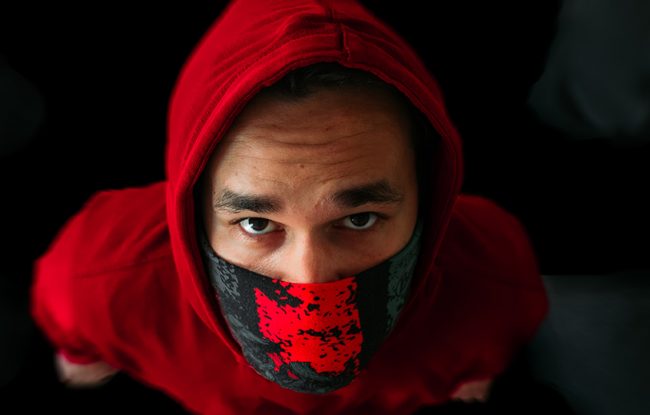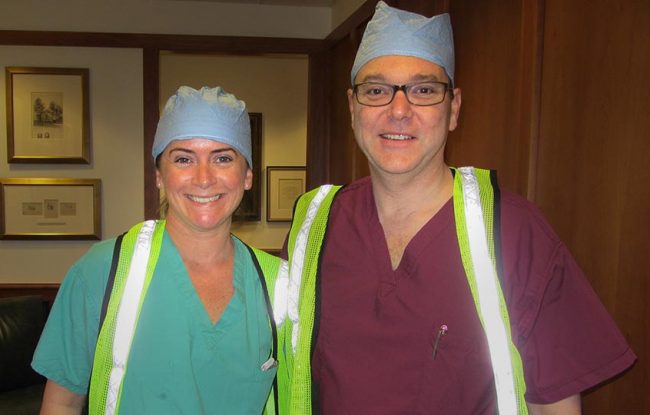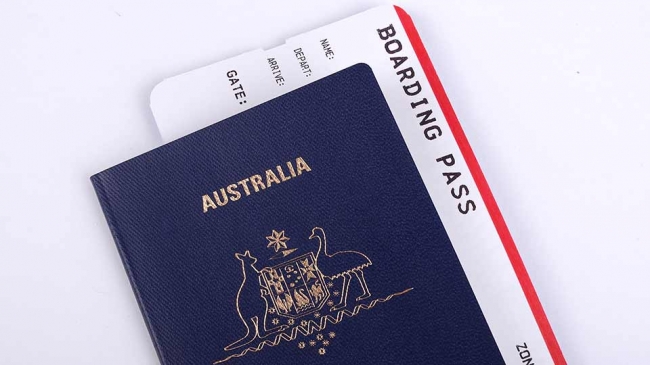Review consultation protocols for head and neck cancer patients during COVID-19
These arrangements are correct at the time of writing but are subject to change. Â Your consultation may be rescheduled due to clinician availability and campus safety. As the coronavirus situation escalates it is possible that our clinical team will be required on the frontline.
Information contained here includes:
- Review consultations: face-to-face or Telehealth?
- Face-to-face consultation arrangements during COVID-19 shutdown
- Telehealth consultation arrangements during COVID-19 shutdown
It is a confusing time for head and neck cancer patients. New patients and those undergoing acute treatment are in constant contact with their clinicians. However, review patients who are beyond the initial or acute stage of treatment have less frequent contact which can lead to greater uncertainty. Understandably many of you are calling my practice to ask whether or not you should attend your next scheduled review consultation. To help answer your questions my team and I have implemented protocols and compiled information explaining which patients need to keep their face-to-face consultations and which can receive care via Telehealth. These protocols apply to both private and public patients but the communication system will vary. Private patients will be contacted by my practice staff approximately four weeks ahead of their consultation. Public patients will be contacted by St Vincent’s Outpatients. The phone number for Outpatients is 02 8382 3110. We ask you for your patience and understanding at this difficult time.
Review consultations: face-to-face or Telehealth?
In light of the coronavirus shutdown, I have introduced a twice-weekly meeting with my staff to discuss those patients with scheduled review consultations. We are reviewing your needs on a case by case basis. Our goal is to review consulting lists four weeks in advance. One reason we are working four weeks in advance is to provide adequate notice to patients who need to make travel and accommodation arrangements. My staff will be contacting each of you to let you know whether or not you need to attend in person and to ensure the logistical requirements of your consultation are organised to meet your individual requirements. There are a number of factors that determine whether you need a face-to-face or a Telehealth consultation. The criteria are outlined below.
Patients who need face-to-face consultations
If I need to scope you I need to see you. The reasons for examining patients by flexible nasendoscopy include but are not limited to;
- Stage of treatment – if you are less than two years down the track and the site of your cancer is down your throat then you need a flexible nasendoscopy so I can check the site of your surgery.
- Diagnosis – the rate of recurrence varies between different head and neck cancers and from site to site.
- Surgical pathology
- Post-operative complications
- How worried I am about you – I worry about all my patients but some of you have cancers which give me more reason to lie awake at night than others.
Instructions for face-to-face consultations in my private practice during the coronavirus shutdown can be found here.
Patients who are suitable for Telehealth consults
Telehealth works for those of you who do not need to be physically examined or who are at greater risk if you were to contract COVID-19. This includes patients who are;
- More than two years down the track after their initial treatment
- Recovering from treatment for skin malignancies
- Recovering from treatment for parotid cancers
- Aged over 70 and/or immuno-compromised
- Quarantined or self-isolating due to COVID-19 diagnosis or close contact exposure
Instructions for Telehealth consultations in my private practice during the coronavirus shutdown can be found here.
You don’t need a smartphone for Telehealth
There is more information about Telehealth below but I want to be clear that you do not need a smartphone in order to have a Telehealth consultation. There is no doubt that Telehealth works best when there is a video connection but you do not need a smartphone or computer with a camera to conduct a Telehealth consultation. If I do not need to see any images of your treatment site the consultation can go ahead using voice only on a standard fixed phone or land line. This also applies if your internet connection is inconsistent or unreliable.
Face-to-face review consultation arrangements during COVID-19
If I determine that you require a face-to-face consultation a member of my team will contact you approximately four weeks ahead of your consultation to confirm the details.
Four weeks before your consultation
- My staff will call and advise a face-to-face consultation is required.
- They will also advise if you require tests or other investigations.
- Your Medicare and referral details will be confirmed. If you need a new referral we recommend you book a Telehealth consultation with your GP.
- You will be asked to limit the number of people who attend your consultation to yourself or one other. If additional family members wish to be involved in discussing your care we can arrange a video conference. If this is required please advise my team when you confirm your consultation.
- You will be asked whether or not you have been diagnosed with or tested for COVID-19.
- You will be asked if you have had known close contact with someone diagnosed with COVID-19.
- You will be advised that your consultation will be limited to fifteen minutes.
- My staff will send you an email or letter confirming your consultation so you have documents supporting your reason to travel if required.
In the days leading up to your consultation
- My staff will call you to check whether or not you have experienced any cold or flu symptoms since your earlier conversation.
- You will be reminded that your consultation will be limited to fifteen minutes.
- You will be reminded to bring a credit or debit card in order to avoid paying cash.
- You will be reminded to bring your own reading material to keep you occupied while waiting to be seen. This is because we have removed all reading material from the waiting room for reasons of infection control.
On the day of your consultation
- When you arrive at the entrance to St Vincent’s Private Hospital you will be asked to provide proof of identity and your reason for entering the building.
- When you arrive outside Suite 1403 please wait for permission to enter. Wave to our staff through the glass door to announce your arrival. They will indicate whether or not you can enter. Â This is to reduce the number of people congregating in the waiting area at any one time.
- If you are more than ten minutes early for your consultation you will be asked to leave Suite 1403 and wait in the larger public areas of the building where it is easier to practice physical distancing.
- You will be asked to use hand sanitiser on arrival.
- Staff will ask you and anyone attending the consultation with you to complete a COVID-19 screening questionnaire.
- You and anyone attending with you will have your temperature taken. This is a condition of attending the consultation.
- You may be asked to wait elsewhere until the doctor or nurse is ready to see you. We have removed all but two chairs from our waiting room.
After your consultation
- Please pay for your consultation by card rather than cash.
- Please stand behind the orange line on the carpet except when using the EFTPOS machine in order to maintain appropriate physical distance from our reception staff.
A few other things
I need you to be honest about COVID-19 concerns
Most of my patients are more frightened of cancer than they are of COVID-19. If you have COVID-19 or fear that you have been exposed please do not think we will refuse to see you. In such an instance we will either delay your consultation by a week or two and/or increase our infection control measures.
Regional patients – travel arrangements
Given the current flight restrictions we know that no patients will be flying so you may be driving or traveling by train. In response to this we will ensure you are provided with appropriate documentation to explain your need for travel. Electronic and verbal approvals for IPTAAS forms are currently being considered as a means of reducing paperwork transactions. Please check the IPTAAS website for updates.
Regional patients – accommodation
Be prepared to make different arrangements because of the government’s physical distancing requirements to reduce transmission of coronavirus. When you have previously visited Sydney you may have stayed with friends and family. This will no longer be possible because during coronavirus shutdown your families and friends should not allow you to stay in their homes. Number restrictions now also apply to St Vincent’s subsidised accommodation. We hope that by contacting you four weeks ahead of your consultation that you have adequate time to make accommodation arrangements that are both within your means and which meet social distancing and home isolation requirements.
Interstate Patients
Interstate patients who can drive to Sydney may meet the criteria for a travel permit. At the time of writing this information is unclear and varies from state to state. My staff will contact you to discuss your individual situation and possible solutions.
Telehealth Review consultations during COVID-19
If my team and I determine that you require a face-to-face consultation a member my practice team will contact you approximately four weeks ahead of your consultation to confirm the details.
How does Telehealth work?
Telehealth is basically a video consultation. It is similar to Skype of FaceTime and can be conducted online or by phone. Many GPs are using Telehealth for the first time and are willing to consult patients over the patient’s choice of platform, including Zoom. But there are known privacy problems associated with these platforms which is why St Vincent’s prefers to use Pexip. Pexip is the NSW Health approved secure video conferencing platform. It works on both android and Apple devices. You can learn more about Telehealth and St Vincent’s here.
You don’t need a smartphone for Telehealth
There is no doubt that Telehealth works best when it involves both voice and video. But don’t worry if you do not have a smart phone or a computer with a video camera. We can still have a consultation with voices only, depending upon whether or not I need to see the site of your treatment.
Four weeks before your consultation
- My staff will call you to advise that your scheduled consultation will be conducted by Telehealth. They will explain the reasons why this is appropriate for your individual situation.
- The cost of the consultation and payment procedure will be explained.
- You will be asked to confirm that you are happy to go ahead with a Telehealth consultation.
- You will be asked whether or not you have a computer or a smartphone which can be used with the St Vincent’s Telehealth service (Pexip works with android and Apple devices).
- You will be emailed or posted the St Vincent’s Telehealth Patient Information Sheet.
- The Telehealth Patient Information Sheet includes tips about selecting an appropriate place for your consultation ie somewhere quiet with good lighting where you can protect your privacy by not being easily overheard.
- Your Medicare number and referral details will be checked. If you need a new referral we recommend you book a Telehealth consultation with your GP.
- If you prefer a face-to-face consultation please advise my staff. They will let me know your concerns and we will review your situation.
In the days leading up to your consultation
- My staff will call you to discuss the technical details of your consultation. This is an opportunity to ensure you have the technical equipment you need for the consultation and know how to use it.
On the day of your consultation
- Please follow the instructions on the St Vincent’s website Telehealth page.
During the consultation
- I will confirm that you are happy to proceed with a Telehealth consultation.
- I may refer you for further tests or recommend a face-to-face consultation.
- Prescriptions can be despatched via mail or fax or the recently introduced Australian Electronic Prescribing scheme.
- If the connection drops out then please return to the virtual waiting room. If I cannot find you there then I or a member of your staff will make a voice call and arrange next steps.
At the end of the consultation
- A member of my team will call you to take payment over the phone and send a claim on your behalf to Medicare.
- Your medical record will be updated as per a face-to-face consultation.
- I will dictate a letter which will be forwarded to other doctors in your care.
What if I still have to travel to St Vincent’s for other appointments?
If you need to travel to St Vincent’s for other medical appointments then we recommend you read our accommodation tips for regional patients during the coronavirus shutdown.
Telehealth – some background
Many of you will have recently heard about the Australian Government’s rollout of whole population Telehealth. It is a great tool in the fight against COVID-19 transmission reduction because it allows for physical distancing between doctors and patients. Telehealth is not a new idea or a new service, it is a delivery system for health care. I am proud to say that I led the St Vincent’s team which pioneered Telehealth in NSW in my capacity as Director of Cancer Services. The potential to help reduce travel and inconvenience for regional and remote patients was obvious. The system we established in 2018 has since been used as model around Australia. If you watch the launch video many of you will recognise members of the Head and Neck Multidisciplinary Team in action. Unfortunately soon after the launch of Telehealth, Medicare funding fell through, a problem which infuriated me at the time. So I am pleased to see the potential of Telehealth being developed albeit with a different billing structure.
More Telehealth in the future
I have been conducting Telehealth consultations for some time and I believe that more of these consultations will happen in the future, especially for regional and isolated patients who are well advanced in their recovery from initial treatment. This is also why I want to encourage clinicians and patients alike to use Pexip rather than other more familiar video conference platforms such as FaceTime or Skype. Pexip is a far more secure platform which is why it was chosen in the first place. Patient confidentiality and privacy is just as important in the digital world as it is in the face-to-face world and I would hate to see it sacrificed purely for the sake of convenience.
In the meantime you may consider donating to the Curran Foundation’s St Vincent’s COVID-19 Response Fund including #scrubsforstvincents. Brett, Lisa and I will be needing all the support we can if we are required on the frontline.




